In a recent business writing class, a participant confessed that she didn’t know a pronoun from a preposition–and she wanted to learn the difference. Why? So she could feel confident about using language correctly.
Knowing the parts of speech can help you:
- Recognize which words to capitalize in a title and after a greeting.
- Know which words need an apostrophe to form the possessive.
- Know when to insert a comma to connect two sentences correctly.
- Use the right labels to find information in a search.
- Disagree confidently with people’s out-of-date rules.
Do you know the parts of speech? See whether you can label each one in the example below. Every part of speech except interjections appears.
- I bought drinks and deli food at the supermarket first.
Did you recognize all of them?
A few parts of speech may have surprised you. You may have thought of drinks as a verb, but in this sentence it’s a noun, a thing. You may have marked deli as a noun. It is, in sentences like this one: “I bought bagels at the deli.” But in the sample sentence it’s an adjective describing the noun food. The adverb first may have fooled you too. Sometimes first is an adjective: “This is her first award”; sometimes it’s a noun: “He ranked first.”
Yes, words can function as different parts of speech depending on where they appear in the sentence.
If you would like to improve your understanding of each of the parts of speech, read on for detailed explanations and chances to check your knowledge.
Nouns
A noun names a person, place, thing, or idea.
- Person: customer, client, entrepreneur, mother, Dr. Singh
- Place: New York, Mykonos, hospital, home, school
- Thing: cookie, desk, smoking, wall, sculpture
- Idea: initiative, loyalty, racism, love, knowledge
Find the nouns in the sentence below. Then label all the parts of speech.
- Elle wrote cards to the clients in Brussels to express sympathy.
How many nouns did you label? I found five.
Why it helps to recognize nouns
You need to capitalize all nouns in titles and headings:
- The Cat in the Hat for President
You capitalize nouns in greetings:
- Hello Team,
- Dear Customer,
When nouns are possessive (showing ownership), they need an apostrophe:
- Joe‘s
- Hillary Clinton‘s
- The three employees‘
You need to recognize the noun (or pronoun) that is the simple subject to choose the right verb:
- Your knowledge of the ins and out of benefits makes you a valuable employee. (knowledge . . . makes)
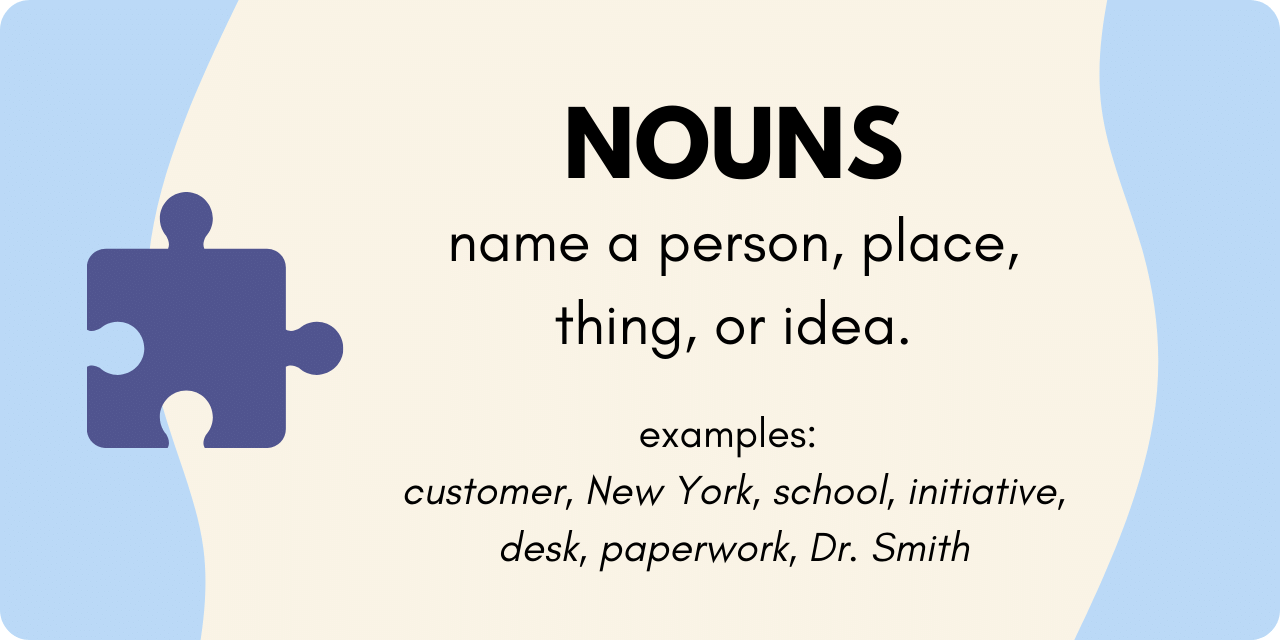
Pronouns
A pronoun takes the place of a noun.
When you introduce a new employee, you don’t have to use her name constantly. You can replace Awatef with she, her, hers, and herself. Those pronouns take the place of the noun Awatef.
As you review this list of pronouns, recognize how each one might stand in for a noun:
- I, me, mine, myself
- You, yours, yourself, yourselves
- We, us, ours, ourselves
- He, him, his, himself
- She, her, hers, herself
- It, its, itself
- Who, whom, whose, whoever, whomever
- Nobody, no one, somebody, someone, anybody, anyone, any, none, everything, everyone, all
- that, those, this, these
Find the pronouns in the sentence below. Then label the other parts of speech.
- I myself heard someone say it.
Did you find four pronouns?
Things to know about pronouns
You need to capitalize all pronouns in titles and headings:
- Is It You, Me, or Adult A.D.D.?
You do not capitalize pronouns in greetings:
- Hello everyone,
- Hi all,
Most possessive pronouns do not have apostrophes:
- its (not it’s or its’)
- ours
- yours
- his
- hers
- their
But: everyone’s, someone’s, no one’s
Pronouns need to agree with the word they represent:
- The board has chosen its new chairperson.
- Board members have chosen their new chairperson.
Some style guides now accept the use of the pronouns they and their as singular forms. This approach frees us from gender concerns in sentences like this:
- Ask the teacher whether they require a group project.
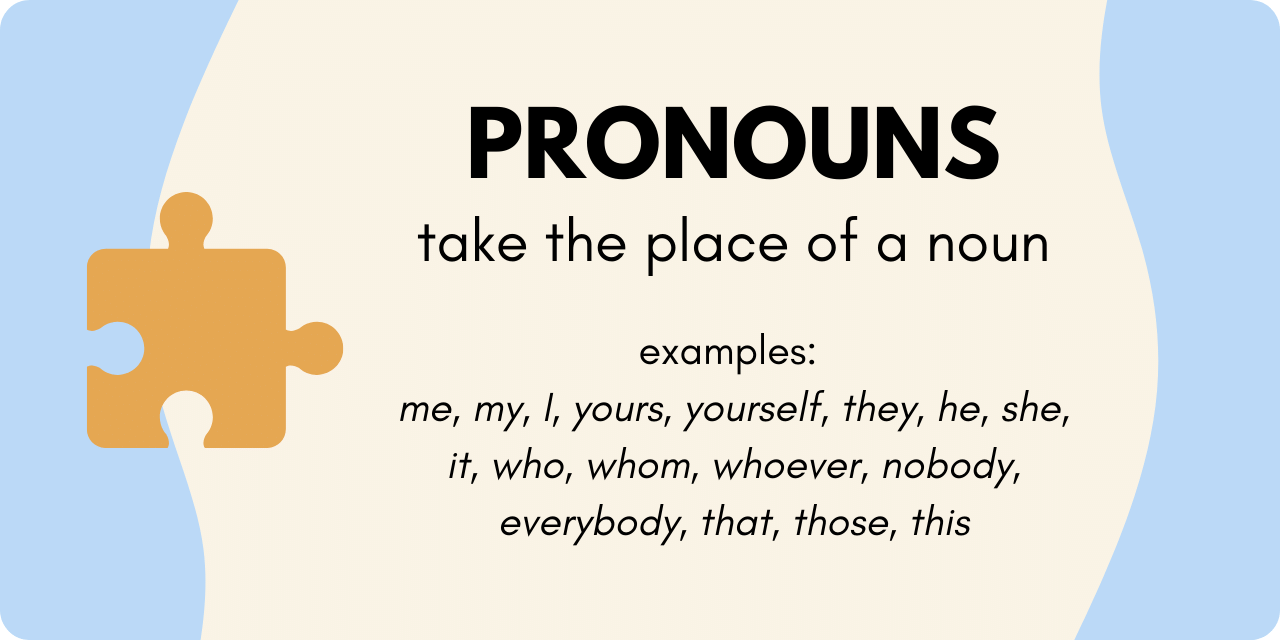
Adjectives
Adjectives describe nouns and pronouns.
Often adjectives come before the words they describe; sometimes they come later in the sentence.
Examples with adjectives underlined:
- I’d like more of that delicious broccoli.
- That broccoli tastes delicious.
- He is qualified.
- Two qualified applicants will come in today.
Words can work as adjectives in some sentences even though they are other parts of speech in other sentences.
- She wore the purple [adjective] dress.
- Purple [noun] is her favorite color.
- The Italian [adjective] people welcomed her.
- Italians [noun] are welcoming people.
The articles a, an, and the also describe, or introduce, nouns.
- An apple a day keeps the doctor away.
In the sentence below, find the adjectives. (Hint: They all describe the same thing.) Then identify the other parts of speech.
- His first talk was better and shorter.
If you didn’t find four adjectives, look again. You may have labeled his as a pronoun. But in this sentence, it’s an adjective describing which talk.
Things to know about adjectives
You need to capitalize all adjectives in titles and headings (but not articles unless they are the first word):
- One Fish Two Fish Red Fish Blue Fish
- The Secret Life of Bees
- A Bend in the River
You need to capitalize proper adjectives (those made from proper nouns):
- the Brazilian people
- warm French bread
- Hodgkin’s disease
Sometimes replacing adjectives with verbs and nouns can strengthen your writing:
- The book was fascinating. [adjective]
- The book fascinated [verb] me.
- The house was huge. [adjective]
- The mansion [noun] sits atop two acres.
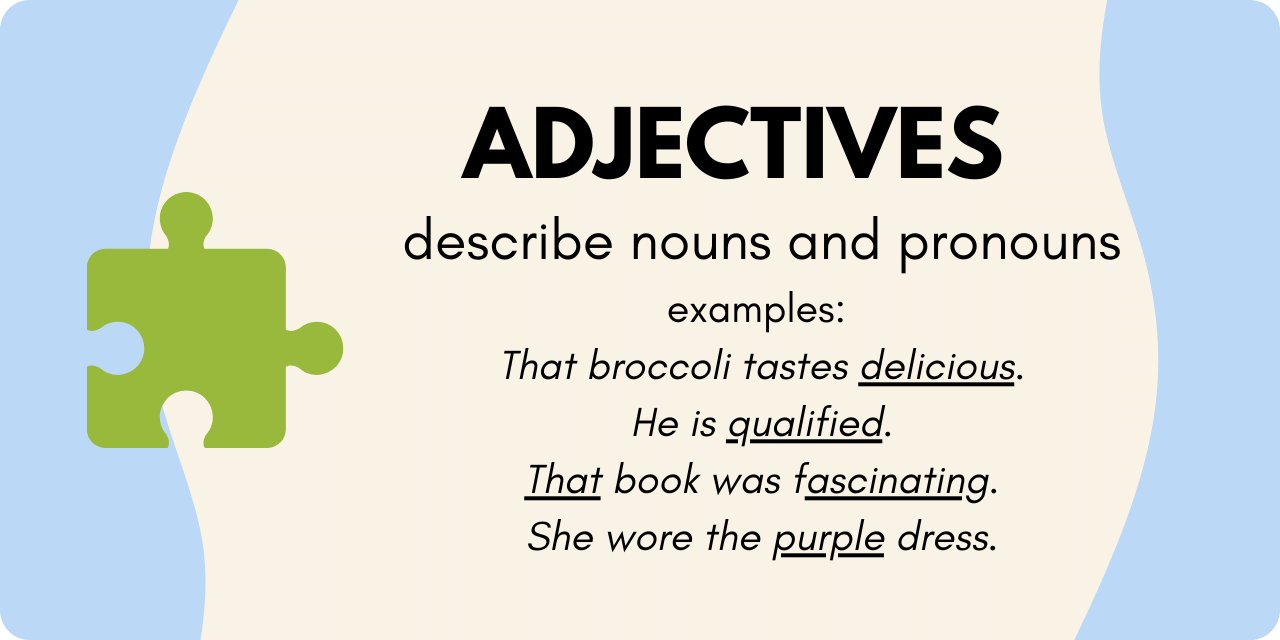
Verbs
Verbs show action or state of being. A verb can be a word or a phrase.
Action verbs:
- He wrote both recommendations.
- Are you going to work on the project?
- I would have liked to take today off.
State-of-being verbs:
- I feel excited about the outcome.
- Rob is the new manager.
- You have been productive this week.
Identify the verbs in the sentence below. Also mark the other parts of speech.
- Do you plan to relax or work in NYC?
Did you mark four words as verbs?
A few things to know about verbs
You need to capitalize all verbs in titles and headings, even if they are very short:
- Future Crimes: Everything Is Connected, Everyone Is Vulnerable and What We Can Do About It
- Who Says Elephants Can’t Dance? (Can’t is the contraction of can, a verb, and not, an adverb.)
Often replacing state-of-being verbs with action verbs strengthens your writing:
- The class was [state of being] helpful.
- The class helped [action] everyone.
- There is [state of being] a lack of uniformity in the procedures.
- The procedures lack [action] uniformity.
Verbs often paint stronger pictures than adjectives–in resumes, for example:
- I am detail oriented. [adjective]
- I created and compiled [action verbs that paint a picture] evaluations.
Action verbs are typically more concise than their noun counterparts:
- We made a determination [noun] about our strategy.
- We determined [action verb] our strategy.
- We came to agreement [noun].
- We agreed [action verb].
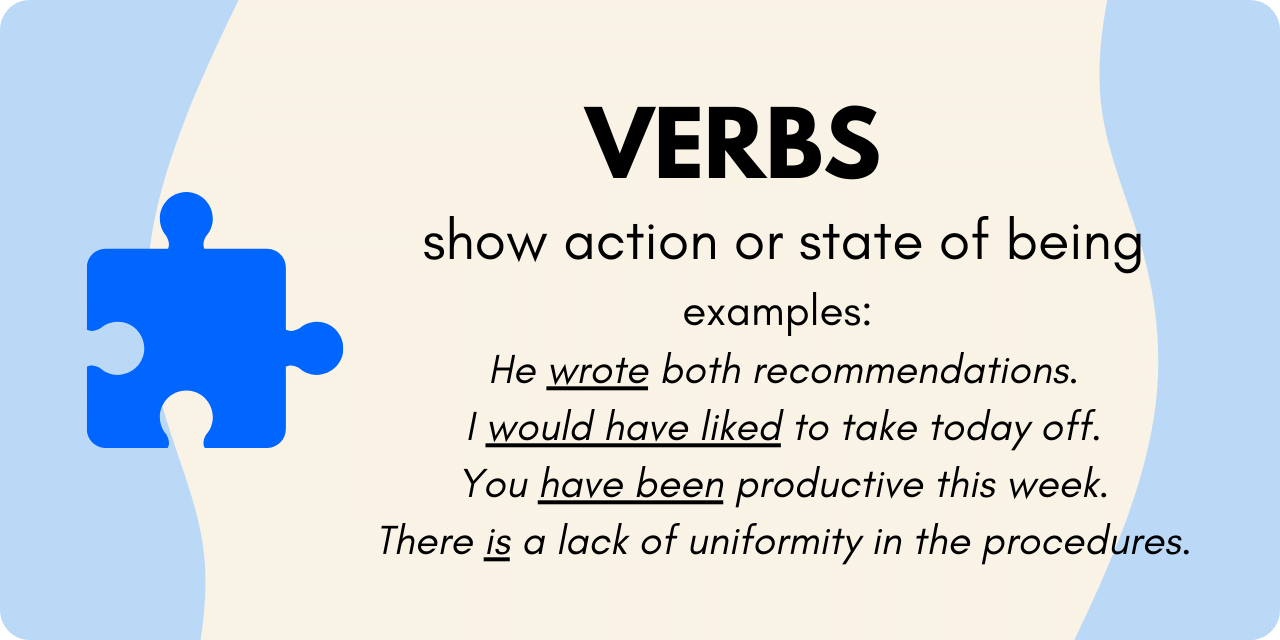
Adverbs
Adverbs describe, or modify, verbs, adjectives, or other adverbs.
Adverbs (underlined) describing verbs:
- writes quickly
- beautifully depicts
- skis well
- is leaving now
Adverbs describing adjectives:
- richly expressive
- terribly wordy
- consistently punctual
- rather unusual
Adverbs describing other adverbs:
- really well
- too quickly
- very pointedly
- extremely awkwardly
Find the adverbs and other parts of speech in this sentence:
- He worked too fast and scored very poorly today.
If you didn’t find five adverbs, try again.Here’s an explanation:
- Fast modifies the verb worked. (How did he work? Fast.)
- Too modifies the adverb fast. (How fast? Too fast.)
- Poorly modifies the verb scored. (How did he score? Poorly.)
- Very modifies the adverb poorly. (How poorly? Very poorly.)
- Today modifies the verbs worked and scored. (When did he work and score? Today.)
Tips on adverbs
You need to capitalize all adverbs in titles and headings, even when they are very short:
- The Not So Big House: A Blueprint for the Way We Really Live
- What Got You Here Won’t Get You There
You can use concise adverbs to replace wordy phrases:
- on an annual basis = annually
- at the present time = now
- in a consistent manner = consistently
- most of the time = usually
Watch out for redundant adverbs, those that repeat a meaning that is clear from the verb the “modify”:
- refer back
- reply back
- recur again
- continue on
- combine together
- finish up
Overusing adverbs such as really and very leads to weak writing. Rather than modify a word with adverbs like those, find the right word that doesn’t need an adverb boost. Make changes like these:
- “She is a very careful editor” = “She is a meticulous editor.”
- “He writes really well” = “He writes beautifully.”
- “It’s way too hot” = “I’m roasting.”
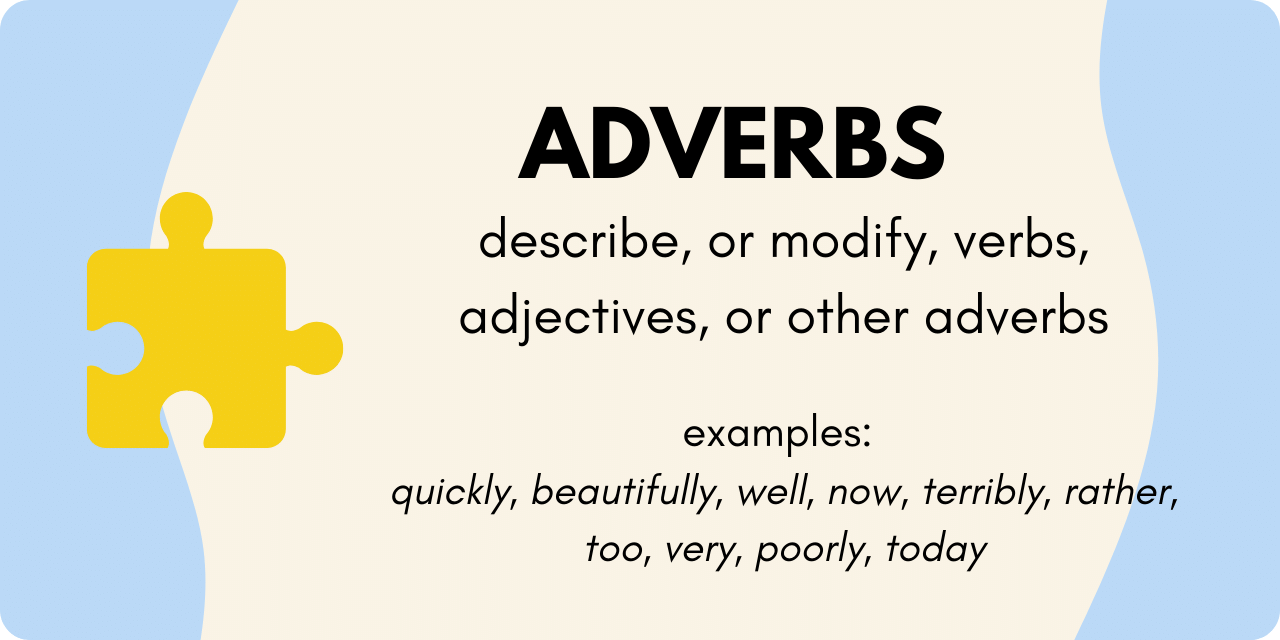
Prepositions
A preposition begins a phrase that leads to a noun or pronoun. Common prepositions are in, with, to, from, at, of, for, on and through.
Examples of prepositional phrases:
- I wrote to the author.
- The roses are in the reception area.
- On the other hand, he works at home.
- This information stays between you and me.
- He works from 9 to 5.
- With Carol, it’s difficult to know. (“To know” is not a prepositional phrase. It’s an infinitive, a verb form that begins with the preposition to, like “to be or not to be.”)
Look for three prepositional phrases in this sentence:
- I spoke to the managers on Friday at their weekly meeting.
The prepositions are to, on, and at. Each of those prepositional phrase ends in a noun: managers, Friday, and meeting.
Helpful hints on prepositions
Style guides differ on whether to capitalize prepositions in titles. The Chicago Manual of Style (Chicago) and the MLA Handbook don’t capitalize any prepositions in titles. The AP Stylebook (AP) and The Gregg Reference Manual capitalize all prepositions of four or more letters.
- Chicago style: Across the River and into the Trees
- AP style: Across the River and Into the Trees
- Chicago style: Dogs Never Lie about Love
- AP style: Dogs Never Lie About Love
It’s perfectly acceptable to end a sentence with a preposition–no matter what your teacher said! However, it’s more formal to keep the prepositional phrase in its normal order:
- Informal: Type the name you want to search for.
- Formal: Type the name for which you want to search.
- Informal: Grace Johns is the lead you have been assigned to.
- Formal: Grace Johns is the lead to whom you have been assigned.
You still need to watch out for redundant prepositions:
- There are fees you will have to pay for.
- What time is the meeting at?
- Where did Charles go to?
This blog post tells you to Cut Unnecessary Prepositions–But Not These.
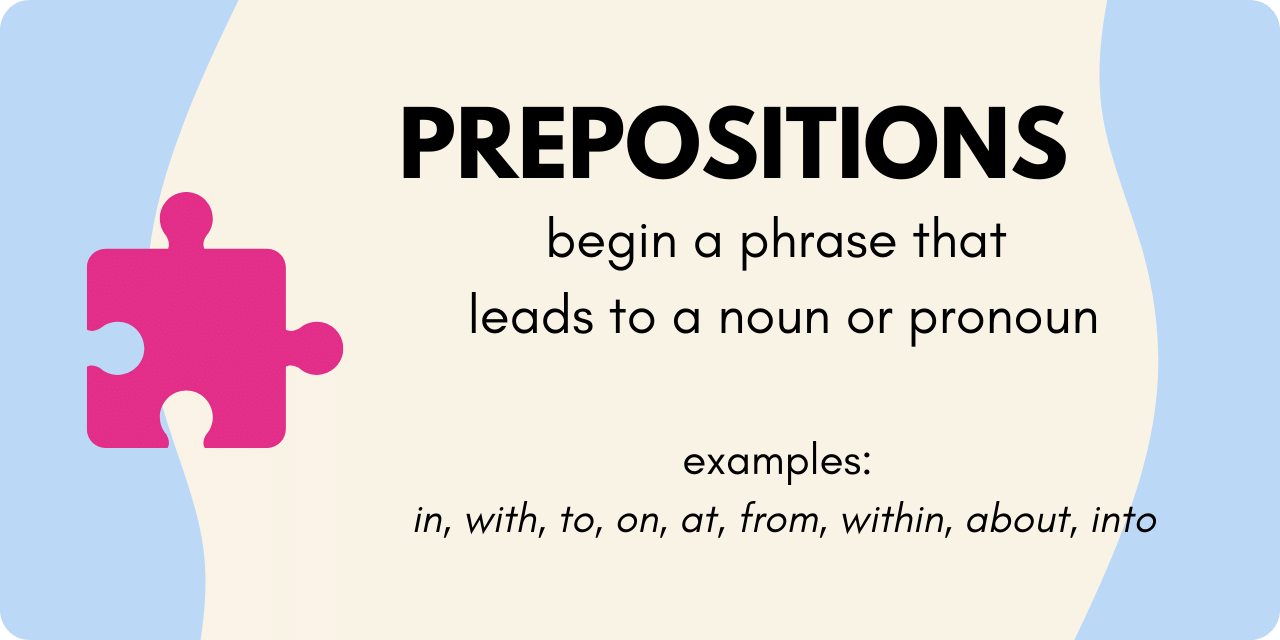
Conjunctions
Conjunctions connect words, phrases, and clauses. Some common ones are the coordinating conjunctions and, but, or, nor, for, yet, and so, and the subordinate conjunctions when, if, because, although, and since.
Tips on conjunctions
It’s fine to start a sentence with one, but it’s more formal not to:
- And we will finish the designs next week.
- In addition, we will finish the designs next week. (more formal)
- But we still need to get input from the client.
- However, we still need to get input from the client. (more formal–however is an adverb, not a conjunction)
Don’t capitalize short conjunctions (and, but, or, nor, for, yet, and so) unless they are the first word of the title or subtitle, or the last word of the title. AP, Chicago, and The Gregg Reference Manual agree on this capitalization:
- To Have or to Be
- Ok, so Now You’re a Vegetarian
- 1,000 Places to See Before You Die
An important comma rule on coordinating conjunctions: When you use a coordinating conjunction to connect two sentences (independent clauses), you need a comma before the conjunction:
- Gayle will pick up Mika, and John will take the train.
- Cars are rusting in the lot, but wild flowers are bursting with blossoms.
- We heard different stories, yet we came to the same conclusion.
When you connect two very short sentences, you don’t need the comma unless leaving it out would cause confusion:
- I drive and he navigates.
You can remember coordinating conjunctions because they spell out FANBOYS: For, And, Nor, But, Or, Yet, So.
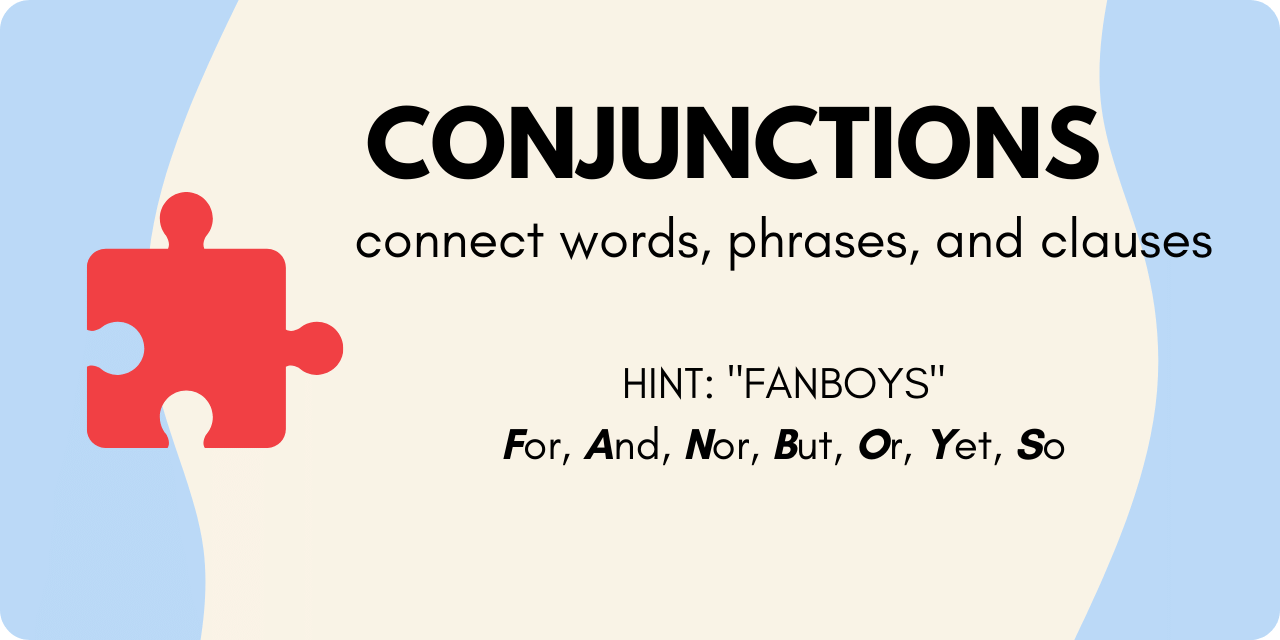
Test Yourself
How about a final test that covers the last part of speech?
Label the parts of this sentence:
- We use interjections sparingly for emotional effect–yes!
Did you find seven different parts of speech? Your dictionary can help you identify the part of speech of any word. Remember: The part of speech can change depending on how the word acts in the sentence.






